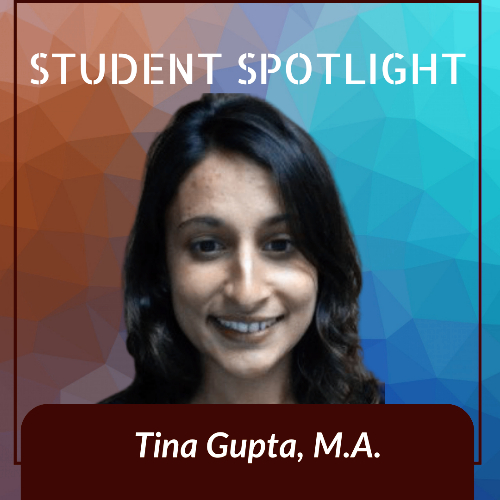by Julia Case, Temple University
Tina Gupta, M.A., is a 5th year graduate student at Northwestern University, working with Dr. Vijay Mittal in the Adolescent Development and Preventive Treatment Program (ADAPT). Tina was nominated for our Student Spotlight by a peer, Hollen Reischer. Here’s what Hollen said about why she nominated Tina:
“I nominated Tina because she is a very well-rounded, dedicated, caring scholar and colleague. In addition to approaching her clinical work as both a clinician and a scientist, she also brings self-awareness and considers her clients’ complex identities. She honors the real-world importance of our clinical work to our clients – she has a great respect for the value of supervision and consultation. As a researcher, Tina is extremely thoughtful, hardworking, and rigorous. Her research is meaningful and important. And, as a colleague, she is consistently supportive, kind, and authentic. I really admire Tina and look forward to seeing all she does in what will be a tremendous career!”
Following her nomination for the Student Spotlight, Tina was interviewed to find out more about her background and current research and clinical work, her plans for the future, and her take on PCSAS. Here’s what Tina had to say!
On her background:
I grew up in Cleveland, Ohio and went to college at University of Colorado Boulder. My interest in mental health emerged because I wanted to understand the factors contributing to the onset of mental illness, teasing apart why and how psychopathology develops, before clinical course rapidly progresses. After I graduated from college, I served as a lab coordinator for ADAPT, which is where I started to find my stride in this field. There, I contributed to research investigating vulnerability markers among those at risk for developing psychosis. Currently, I am continuing this work with ADAPT, now as a graduate student.
On her research:
I work with adolescents and young adults at risk for developing psychotic disorders. I examine emotional processes like how individuals display facial expressions and experience emotions. I use diverse methodologies including automated facial analysis, neuroimaging, electromyography, and self-report measures. I am also intrigued by the notion that individuals at risk for psychosis exhibit unique clinical presentations, so I investigate this clinical heterogeneity and differing trajectories of clinical course.
On why she is interested in this work:
Emotions are a way we engage with our environment, by signaling important information to ourselves and to other people. When impairments arise, this impacts functioning and wellbeing. Through understanding emotional processes amongst those at risk for developing psychotic disorders, we can pinpoint individual differences and use this to inform the development of targeted treatments and prevention strategies.
On her clinical work:
In Dr. Mittal’s research lab, I administer clinical assessments; this aspect of my training supports my research efforts in that I can directly understand through these interviews how impairments in emotional processes may influence people’s lives. I have also completed clinical placements at The Family Institute, where I implement empirically-supported behavioral interventions. My aim in my clinical work is to help clients build awareness and develop skills to facilitate building a life in line with one’s values and goals.
On what excites her most about her work:
We already know so much about emotion; and at the same time, there are still so many mysteries! It’s exciting to go through the process of trying to unravel these unknowns and make sense of what might be happening when the ability to effectively experience and express emotion declines. Additionally, I find working with others in the field to be incredibly rewarding. I see research as collaborative, and some of my favorite moments in graduate school have been discussing articles in class and learning from others.
On how she hopes her work will impact society:
I hope that my research can help inform the larger community of the notion that mental illness often does not develop suddenly but instead, typically over the course of time. Similarly, there are also signs and signals of early mental illness that are important to investigate in efforts to prevent later disease emergence. I believe that through research, we can help families and the larger community in their efforts to identify individuals who could benefit from assessment and treatment before their symptoms progress.
On what it means to be a good clinical scientist:
A good clinical scientist is someone who asks thoughtful research questions and then seeks to answer them using diverse methods. A good clinical scientist keeps up to date with new research and clinical practices and is constantly learning. Finally, a good clinical scientist is someone who is rigorous in the design and implementation of their research, and who approaches science in an interdisciplinary fashion.
On PCSAS:
I appreciate PCSAS’s mission and goals to advance public health. I think it is important that PCSAS supports the clinical science training model and emphasizes the benefits of both basic and applied research. PCSAS promotes education and training to facilitate the advancement of knowledge and skills, which can benefit our society at large.
On her hopes for the future:
For my personal future, I hope to have my own research program continuing to investigate emotional processes among individuals at risk for psychotic disorders. My hope for the future of clinical science is that researchers continue to be collaborative, use best research practices, have discussions, support the translation of research findings into real-world settings, and significantly contribute to the advancement of scientific knowledge.
Interested in nominating a student to be featured for a future edition of the Newsletter? Reach out to the PCSAS Newsletter at pcsascontributions@gmail.com!
Disclaimer: The views and opinions expressed in this newsletter are those of the authors alone and do not necessarily reflect the official policy or position of the Psychological Clinical Science Accreditation System (PCSAS).


